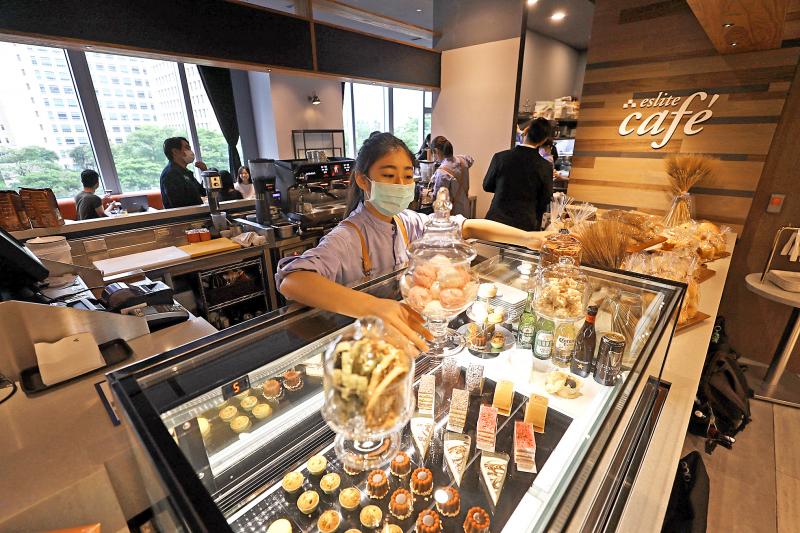Sales across Taiwan’s food and beverage sector nosedived 22.8 percent year-on-year to NT$47.9 billion (US$1.59 billion) last month, the largest decline in 20 years, the Ministry of Economic Affairs said yesterday.
One of the first victims of the COVID-19 outbreak, the sector has posted double-digit annual declines in sales for three months in a row.
“Restaurants ... took the biggest hit, as the strict anti-epidemic measures implemented have had a notable impact [on revenue],” Department of Statistics Deputy Director-General Wang Shu-chuan (王淑娟) told a news conference in Taipei, referring to seating schemes spacing diners further apart. “Consumers are also less willing to eat out for fear of catching the virus.”

Photo: CNA
The government’s ban on international visitors, which has been in place since March, also dealt a heavy blow to restaurant sales, she said.
Total restaurant sales last month fell 23 percent year-on-year to NT$38.9 billion, ministry data showed. Tea stalls’ sales faced a similar, albeit less severe, decline, contracting 16.6 percent year-on-year to NT$6.6 billion.
With the airline sector practically at a standstill amid a global lockdown, domestic catering services reported a 32.3 percent drop in sales to NT$2.5 billion.
“Hopefully the [food and beverage] sector will soon recover some momentum as the coronavirus situation comes under control,” Wang said.
She forecast an 8 to 15 percent annual decline in food and beverage sales for this month, after taking into account sales linked to Mother’s Day.
The retail sector posted a 10.2 percent year-on-year decrease in sales to NT$277.8 billion, the biggest decline in more than 11 years, ministry data showed.
The lackluster figure was partly due to dwindling sales of general merchandise, which fell 8.5 percent to NT$94.1 billion, as department store sales slumped nationwide.
The drop in international crude oil prices also drove sales of petroleum and chemical products down 39.9 percent year-on-year to NT$13.3 billion, the data showed.
“Most industries [in the retail sector] suffered declines [in sales] last month, with the exception of the e-commerce industry, which grew 19.1 percent year-on-year to a record high of NT$18.3 billion,” Wang said.

Zhang Yazhou was sitting in the passenger seat of her Tesla Model 3 when she said she heard her father’s panicked voice: The brakes do not work. Approaching a red light, her father swerved around two cars before plowing into a sport utility vehicle and a sedan, and crashing into a large concrete barrier. Stunned, Zhang gazed at the deflating airbag in front of her. She could never have imagined what was to come: Tesla Inc sued her for defamation for complaining publicly about the vehicles brakes — and won. A Chinese court ordered Zhang to pay more than US$23,000 in

Taiwan Semiconductor Manufacturing Co (TSMC, 台積電) yesterday said that its investment plan in Arizona is going according to schedule, following a local media report claiming that the company is planning to break ground on its third wafer fab in the US in June. In a statement, TSMC said it does not comment on market speculation, but that its investments in Arizona are proceeding well. TSMC is investing more than US$65 billion in Arizona to build three advanced wafer fabs. The first one has started production using the 4-nanometer (nm) process, while the second one would start mass production using the

A TAIWAN DEAL: TSMC is in early talks to fully operate Intel’s US semiconductor factories in a deal first raised by Trump officials, but Intel’s interest is uncertain Broadcom Inc has had informal talks with its advisers about making a bid for Intel Corp’s chip-design and marketing business, the Wall Street Journal reported, citing people familiar with the matter. Nothing has been submitted to Intel and Broadcom could decide not to pursue a deal, according to the Journal. Bloomberg News earlier reported that Taiwan Semiconductor Manufacturing Co (TSMC, 台積電) is in early talks for a controlling stake in Intel’s factories at the request of officials at US President Donald Trump’s administration, as the president looks to boost US manufacturing and maintain the country’s leadership in critical technologies. Trump officials raised the

From George Clooney to LeBron James, celebrities in the US have cashed in on tequila’s soaring popularity, but in Mexico, producers of the agave plant used to make the country’s most famous liquor are nursing a nasty hangover. Instead of bringing a long period of prosperity for farmers of the spiky succulent, the tequila boom has created a supply glut that sent agave prices slumping. Mexican tequila exports surged from 224 million liters in 2018 to a record 402 million last year, according to the Tequila Regulatory Council, which oversees qualification for the internationally recognized denomination of origin label. The US, Germany, Spain,